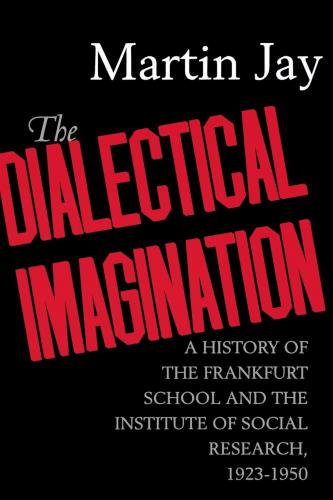And yet, in certain respects, the general theoretical trajectory of at least several members of the School’s first generation can be said to have prepared the ground for the postmodern turn and thus found a new audience for its work. Most obviously, their reluctant jettisoning of a triumphalist notion of impending human emancipation, based on a single story of species-wide progress produced by class struggle, resonates with the characteristic postmodernist abandonment of any meta-narrative, especially one culminating in redemption. In fact, the temporalities of the Frankfurt School, the complex narratives they fashioned of rise, fall, and recurrence, were often as mixed and contradictory as those adopted by many postmodernist thinkers. So too, the radical critique of the Western tradition of instrumental, technological rationality, most extensively elaborated in Dialectic of Enlightenment with its dark ruminations about the entwinement of myth and reason, can be seen as potentially consonant with post-modernist suspicion towards all versions of reason.17 Indeed, it has sometimes been taken as such by those in the School’s second generation, like Habermas, who themselves resist precisely that conclusion.18
Adorno’s “negative dialectics” and Jacques Derrida’s deconstruction have also earned frequent comparisons because of their common rejection of totalizing philosophies of identity, distrust of first principles and origins, suspicion of idealist ideologies of sublation, and valorization of allegorical over symbolic modes of representation. Although the resolutely Utopian Adorno resisted accepting the repetition without resolution that has been so congenial to the deconstructive temper,19 his “melancholy science” has seemed to some only a small step away from the principled refusal to mourn in Derrida. The multi-faceted defense of a certain notion of benign mimesis both in Critical Theory and the work of Philippe Lacoue-Labarthe has also attracted attention, as have certain affinities with Lacan’s critique of ego psychology.20
So too, Michel Foucault’s genealogical history of the body, hostility to normalization and discipline, micrological attention to detail, and fascination with the relations between knowledge and power have been seen as close to the concerns of Critical Theory. Although Foucault famously criticized the Freudian Marxism of Marcuse in his History of Sexuality for assuming a trans-historical norm of libidinal realization, significant parallels have been found in their common questioning of dominant notions of normative sexuality and critique of repressive desublimation.21 Indeed, Foucault himself once admitted that “if I had encountered the Frankfurt School while young, I would have been seduced to the point of doing nothing else in life but the job of commenting on them. Instead, their influence on me remains retrospective, a contribution reached when I was no longer at the age of intellectual discoveries.’”22
A lively battle has also been waged over the contested legacy of Walter Benjamin, in which deconstructionists like Paul de Man, Samuel Weber, Rainer Nägele and Werner Hammacher have sought to read him largely in their terms.23 Derrida himself has been intrigued by Benjamin’s earliest writings, most notably his Critique of Violence, with its still mystical evocation of a notion of divine justice and fascination with primordial violence, as an antidote to the leveling egalitarianism of its human (and humanist) counterpart.24 Benjamin’s complicated debts to French Surrealism have been remembered at a time when the importance of such Surrealists as Georges Bataille for post-structuralism has been widely recognized.25 Although the stubbornly redemptive moment in Benjamin’s thought, as well as his belief in an Adamic Ursprache in which name and thing were one, are hard to reconcile with deconstruction’s suspicion of plenitudinous origins and endpoints, there is sufficient warrant in the tangled web of texts he left behind to place him at least in a tense constellation with these later thinkers.
This is not the place to present a serious analysis of all the parallels and contrasts between Critical Theory and postmodernism their various guises. Suffice it to say that the post-New Left context of reception has been generally hospitable to the continued appropriation of at least certain legacies of the Frankfurt School, which have become powerful “stars” in what Richard Bernstein has dubbed “the new constellation” of contemporary thought.26 As Jean-François Lyotard himself has acknowledged, “when one reads Adorno now—above all texts like Aesthetic Theory, Negative Dialectics and Minima Moralia —with these names [Derrida, Serres, Foucault, Levinas and Deleuze] in mind, one senses the element of an anticipation of the postmodern in his thought even though it is still largely reticent, or refused.”27
What must, of course, also be acknowledged is that Critical Theory has served for some in the new context as a bulwark against what has seemed the most nihilistic, relativistic and counter-Enlightenment implications of certain postmodern theories. Adorno’s anticipatory refusal of postmodernism (to which Lyotard alludes in the remarks cited above) is derived from his stubborn reluctance to give up on the questions of social justice and truth (understood ultimately as “the true society”), or forego any hope for finding a political means to realize them. Many current exponents of Critical Theory, such as the editors of the new journal Constellations, Seyla Benhabib and Andrew Arato, follow Habermas in tenaciously maintaining the viability of the project of modernity as the way to achieve those goals, stripped, to be sure, of its redemptive or Utopian implications.
If, however, one accepts the distinction between a postmodernism of resistance and one of affirmation, then it may be that the former can legitimately be seen as one of the plausible, if unexpected, offshoots of the Frankfurt School, once at least its more orthodox Marxist baggage is thrown overboard. Even those postmodernists who refuse to move beyond the horizon of Marxism, like Jameson, have found at least Adorno, once a “doubtless ally when there were still powerful and oppositional currents,” now “a dialectical model for the 1990s. His introspective or reflexive dialectic befits a situation in which—on account of the dimensions and unevenness of the new global world order—the relationship between the individual and the system seems ill-defined, if not fluid, or even dissolved.”
